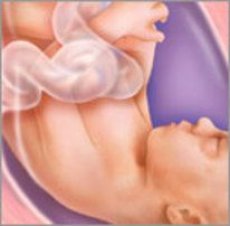Medical expert of the article
New publications
Pregnancy: 28 weeks
Last reviewed: 04.07.2025

All iLive content is medically reviewed or fact checked to ensure as much factual accuracy as possible.
We have strict sourcing guidelines and only link to reputable media sites, academic research institutions and, whenever possible, medically peer reviewed studies. Note that the numbers in parentheses ([1], [2], etc.) are clickable links to these studies.
If you feel that any of our content is inaccurate, out-of-date, or otherwise questionable, please select it and press Ctrl + Enter.

How the child grows:
By this week, your baby weighs a full kilogram and is 15 inches long. She's blinking, her brain is developing billions of neurons, and her body is rapidly gaining weight in preparation for birth.
Important: Each baby's development is unique. Our information is designed to give you a general idea of fetal development.
Changes in the expectant mother
You are moving into the final stages, this week marks the beginning of the third and final trimester. During this period you will gain 5 kilograms.
During the third trimester, visits usually become more frequent and you will need to see your doctor every two weeks, and after 36 weeks, once a week. Depending on your risk factors, your doctor may recommend repeat blood tests for HIV and syphilis, a smear test for chlamydia and gonorrhoea, and a 3-hour glucose tolerance test.
During this period, some women may develop restless leg syndrome, a common occurrence in pregnant women. Try relaxing or massaging your legs, and cut down on caffeine, which can make symptoms worse.
3 Questions About Preeclampsia
Preeclampsia is a complex disorder that affects 3 to 8 percent of pregnant women. A woman diagnosed with preeclampsia has high blood pressure and elevated levels of protein in her urine after 20 weeks of pregnancy. Complications from preeclampsia can damage various organs and cause serious or even life-threatening problems. The only way to get rid of the symptoms is to have a baby.
Symptoms of preeclampsia?
Preeclampsia can develop suddenly, so it’s important to know the symptoms. Call your doctor right away if you notice any of the following warning signs:
- Swelling of the face or eyes, excessive swelling of the hands, feet, or ankles.
- Rapid weight gain
- Severe or persistent headache
- Visual impairment
- Intense pain in the abdominal cavity
- Nausea and vomiting
Preeclampsia can develop without obvious symptoms, especially in the early stages, and some symptoms can resemble normal pregnancy symptoms. So you may not always be able to easily identify the condition, which is another reason why it is so important to attend all appointments.
What are the risk factors for developing preeclampsia?
Women are more likely to develop preeclampsia during their first pregnancy.
Other risk factors include:
- Chronic arterial hypertension
- Bleeding disorders, diabetes, kidney failure, and autoimmune diseases (eg, lupus)
- Genetic predisposition
- Obesity
- Multiple pregnancy
- Age under 20 or over 40
How to prevent the development of preeclampsia?
There are no proven methods to prevent preeclampsia, although research is currently being conducted in this area. Many studies have looked at the ability of calcium, vitamins, and a small dose of aspirin to prevent the disease, but the results have been mixed. At this stage, doctors advise following prenatal care and attending all scheduled medical appointments. At each visit, the doctor will check blood pressure and the level of protein in the urine. It is also important to be aware of the warning signs of preeclampsia so that if necessary, the disease can be quickly recognized and contact a doctor.
This week's activity: Choose a doctor for your child. Consult with your friends and relatives when searching for a pediatrician. Choose a doctor based on reviews, professional qualifications, and convenient location of the clinic.


 [
[